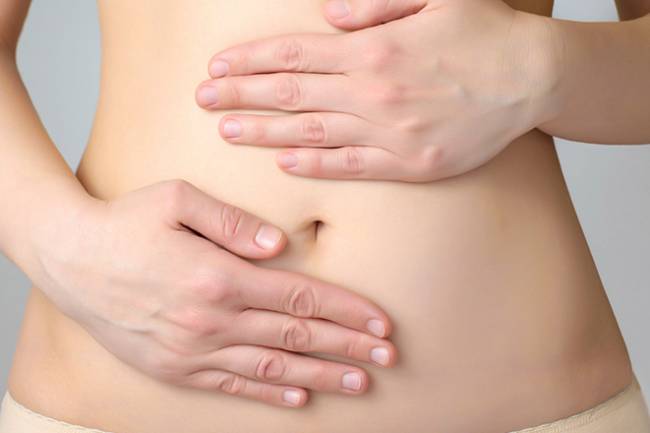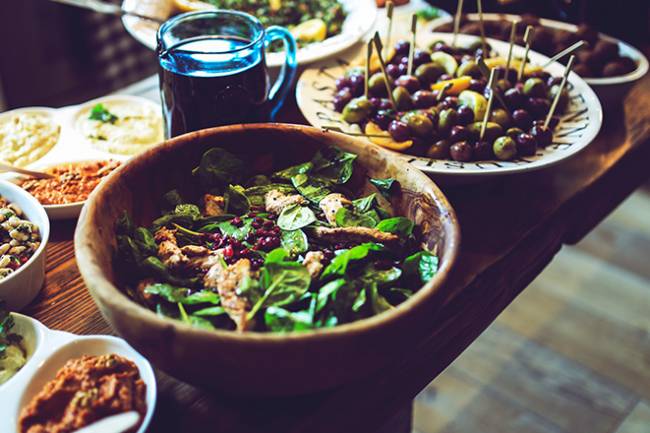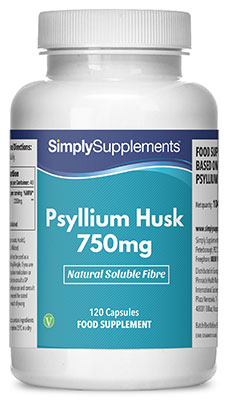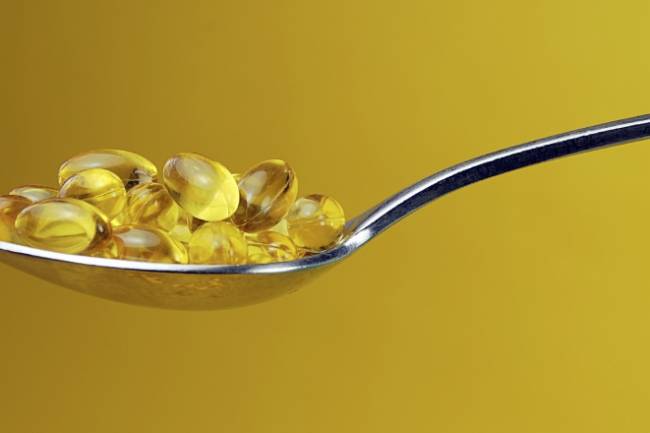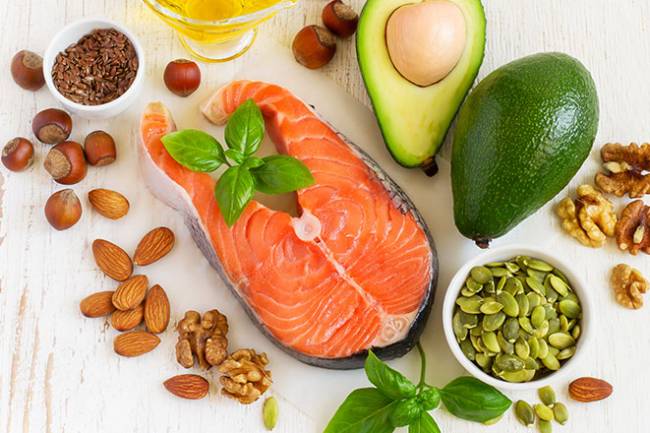Foods to Prevent Constipation
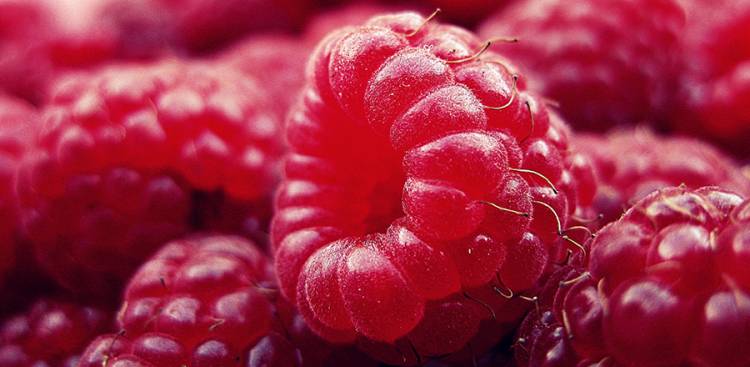
Most of us experience constipation at some point in our lives, so understanding how to prevent or eliminate it ensures you're properly prepared.
Luckily, food is known to play a key role in preventing constipation, meaning that the difference between a healthy and unhealthy bowel movement schedule could be found somewhere in your diet.
That's why we've scoured the internet to create a list of some of the best reported foods to help prevent constipation.
Before we get into it however, let's find out a little more about the issue in question.
What Causes Constipation?
Unfortunately, because of how common constipation is in today's society, there are a lot of different causes that are associated with it. Some of the more common causes include:
Diet
A diet that's low in fibre can cause constipation to occur. Fibre is unique from other nutrients because it doesn't get digested when it reaches the small intestine. Instead, it is used by your body to ensure that stools can make their way through your body uninterrupted.
There are two different kinds of fibre; soluble and insoluble. Soluble fibre absorbs water when it enters the stomach and forms a gel, which is later used to ensure that the stools your body creates are softer and easier to pass through the digestive system. Insoluble fibre is used all the way from the stomach to the colon, helping stools to move through your system to be removed as waste.
We've all heard of the 5-a-day fruit and vegetable recommendation from health professionals. However, it's been reported that only 1 in 4 adults actually meet the suggestion. Since fibre can be found in high amounts in most fruits and vegetables, a low fibre diet may explain why you suffer with bouts of constipation.
Insufficient Water
 Just like sufficient fibre, water is also an essential ingredient for the production of healthy, softer, easily transportable stools throughout the body.
Just like sufficient fibre, water is also an essential ingredient for the production of healthy, softer, easily transportable stools throughout the body.
If you're dehydrated, the little water that your body has is often prioritised for other bodily functions or needs, meaning that the stools your body makes are incredibly hard. This not only makes it more difficult for them to move throughout the digestive system; it also means that passing a stool may become a much harder, more uncomfortable process.
Stress
When you're stressed, your body can experience chemical imbalances which upset a variety of different bodily functions. This includes the balance of chemicals in your stomach, which, in turn, can cause the digestive process to become interrupted, resulting in constipation.
Stress can be a particularly annoying cause of constipation too, because you're likely to find that the two work in a vicious cycle that's hard to break - constipation can cause you to feel anxious and stressed, which in turn can cause constipation to continue.
Pregnancy
Pregnant women are often times at a greater risk of suffering with symptoms of constipation because the pregnancy hormone progesterone causes muscles in the body to relax. This is done to help make plenty of room in order for a baby to growth healthily. Unfortunately though, this same hormone also causes muscles that help to move food and waste throughout the body to slow down, which can potentially lead to constipation.
What Are the Symptoms of Constipation?
The severity of constipation can vary from person to person. However, the symptoms you may experience are always the same, and include:
- Inability to pass stools
- Reduced frequency of bowel movements (fewer than three times a week)
- Stomach cramps and pain
- Harder stools
Food to Prevent Constipation
We mentioned earlier that one of the most prominent and common causes of constipation is a diet that's low in fibre. An article published in 2004 about the effect of fibre on constipation, diarrhoea and irritable bowel syndrome stated that “fibre increases bowel movement frequency modestly in constipation and improves symptoms.”
With this in mind, in order to help prevent constipation from occurring, you should be identifying and adding more fibrous foods to your diet.
Let's take a look at some fibre-heavy foods, aside from the usual fruits and vegetables, that are easy for you to add to your diet.
Cereals and Whole Grains
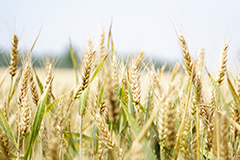 Cereals are the edible grains produced from cultivated grass and offer you the perfect opportunity to kick-start your day with a healthy heap of fibre-heavy foods.
Cereals are the edible grains produced from cultivated grass and offer you the perfect opportunity to kick-start your day with a healthy heap of fibre-heavy foods.
On average, a 100g serving of breakfast cereal will provide you with as much as 10g of dietary fibre, equalling up to a third of your daily recommended intake, which for adults aged 19 to 64 is currently advised as 30g a day.
To explore the effects of dietary fibre on constipation, a meta-analysis study published in 2012 evaluated a series of 19 scientifically written articles, shortlisted from a compiled total of 1322 that discussed the use of dietary fibre and its effects on symptoms of constipation. The meta-analysis methodology like this is often known as a ‘gold standard' in scientific study, because of the large amounts of data they are able to review from other verified experiments.
The authors of the meta-analysis ultimately concluded that “dietary fibre can obviously increase stool frequency in patients with constipation.”
Breakfast is often toted as the most important meal of the day, but a lot of people, either voluntarily or involuntarily, miss out on a good nutritious breakfast when they start their day.
If this applies to you, then initiating a new breakfast routine, complete with a good healthy serving of breakfast cereals means that you've immediately vastly increased your fibre intake, which may be a good means of preventing future constipation.
Legumes
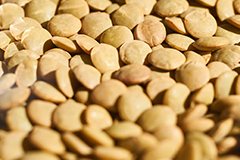 You might not be as familiar with the group of foods commonly categorised as legumes, but rest assured you're unlikely to find more potent and consistent doses of fibre.
You might not be as familiar with the group of foods commonly categorised as legumes, but rest assured you're unlikely to find more potent and consistent doses of fibre.
A legume is described as an agriculturally-grown plant that is used for their seed grain, which is more commonly known as pulse. Despite the small size of legumes, they are packed full of beneficial vitamins and minerals, especially fibre.
Here are some common legumes that you may find the easiest to incorporate into your diet:
- Split peas – 1 cup = 16.3g of fibre
- Lentils – 1 cup = 15.6g of fibre
- Black beans – 1 cup = 15g of fibre
- Baked beans – 1 cup = 10.4g of fibre
As you can see from this nutritional information, legumes may be an ideal food for you to explore to help prevent constipation. Luckily, adopting a lot of these foods can be easily done on a day-to-day basis, with many serving as suitable substitutions for other foods. For example, lentils are often readily used by vegetarians and vegans who are looking for an effective and nutritious meat alternative.
By committing to a change like this, you may begin to see a positive step towards preventing constipation from occurring.
Chia and Flaxseeds
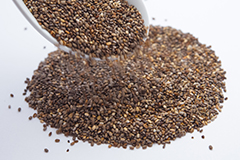 Don't underestimate the nutritional benefits of chia and flax seeds because of their size. 100g of chia seeds contain 34.4g of fibre, whereas 100g of flaxseeds contain 27g.
Don't underestimate the nutritional benefits of chia and flax seeds because of their size. 100g of chia seeds contain 34.4g of fibre, whereas 100g of flaxseeds contain 27g.
However, it's important to note that these portion sizes should be avoided, because although they offer a lot of healthy nutrients, they also contain a lot of calories.
100g of chia seeds may provide around 500 calories, whereas flaxseeds may offer even more with 530 calories.
Now although it's highly recommended that you don't add 100g of these kinds of seeds to your diet on a daily basis, smaller doses are much more easily integrated into your daily dietary habits. For example, both chia and flaxseeds lend themselves as a smoothie ingredient, where they can help boost the fibre content of a fruity morning smoothie.
Blending and grinding seeds also goes a long way to help improve the absorptive rate of the nutrients contained in them, which may help to provide quicker relief to symptoms of constipation. Just like cereals, chia seeds can be soaked in water or milk to create a thick, oaty porridge that can be flavoured with fruits and berries to form a delicious and healthy breakfast.
Be sure to do your own research and find some recipes that both incorporate these ingredients and cater to your specific likes and dislikes.
Raspberries
In truth, all berries are good choices if you're looking to help tackle the constant problem of constipation. All naturally occurring fruits and vegetables possess at least some fibre, but the raspberry sets itself apart from other berry options at the supermarket.
A single 100g serving of raspberries may contain anywhere up to 7g of tasty dietary fibre, whereas other options like strawberries only offer 2g of fibre. The dietary benefits of raspberries don't end at fibre; a 100g serving can also provide 43% of your daily recommended intake of vitamin C, which is required by your body every day to help support the health of your immune system.
Despite the characteristic tart flavour raspberries possess, you don't have to do much to them to enjoy their nutritional benefits. A simple clean with some cold water immediately turns a good heap of them into an ideal mid-morning snack that could easily replace a packet of crisps or milk chocolate bar.
Alternatively they could be blended up as part of a smoothie, added in handfuls to oaty breakfast options or baked into a variety of treats to serve as an extra health kick.
Dark Chocolate
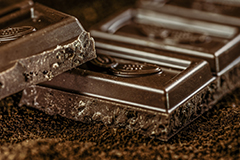 It would be fair for you to assume that chocolate can't offer any positive health benefits, especially when it comes to preventing constipation.
It would be fair for you to assume that chocolate can't offer any positive health benefits, especially when it comes to preventing constipation.
It's true that varieties like milk and white chocolate contain a lot of added dairy ingredients to help improve their texture and appearance. However, dark chocolate, specifically variants that contain upwards of 70% cocoa, can actually provide you with a surprisingly powerful fibre boost.
A 100g serving of high-quality, high-cocoa dark chocolate can provide as much as 11g of dietary fibre, meaning that this delicious treat may be able to work as part of an effective constipation relief treatment.
Dark chocolate is also known to contain a variety of flavonoids and polyphenols, which possess antioxidant properties that may help to aid your body's immune system.
However, before you start adding dark chocolate to your regular diet in 100g servings, it's important to note that although there are positives to be gained from eating it, there are also negatives you need to be aware of. Firstly, even though dark chocolate hasn't had its nutrients diluted by the addition of dairy products, it still naturally contains a lot of sugars and fats. A 100g serving may contain 11g of fibre, but it also provides a massive 42g of fat and over 600 calories.
The best and healthiest way to incorporate dark chocolate into your diet is to do so conservatively, treating yourself to a few squares a day as a treat. Overindulging may result in inadvertent weight gain and potential heart health degradation.
Psyllium Husk
Psyllium is derived from the seeds of a shrub like a plant called Plantago ovata. It contains a fibre called mucilage which absorbs lots of water in the digestive tract and adds bulks to stools. The increased bulk stimulates contractions in the intestinal walls and pushes stools along, while the high water content softens the stools so they are easier to pass.
Many people use psyllium as a safe laxative and to relieve haemorrhoids that are sometimes caused by persistent constipation. Psyllium also has other added health benefits including regulating blood sugar and blood pressure levels, and it can help to relieve IBS-constipation, ulcerative colitis, and Crohn's disease.
Some people also find it beneficial for weight loss as it promotes feelings of fullness and reduces calorie intake.
Learn more about psyllium husk here.
Summary
As you can see, there are plenty of different types of foods that you can turn to for constipation prevention. Fibrous foods can be found in abundance, but before you start swarming your diet with them it's critical to stress that your body is likely to react badly to sudden large increases in fibre intake.
Too much fibre in your diet can cause a variety of problems, including bloating, stomach cramps, diarrhoea, dehydration and flatulence.
To be on the safe side, it is best to start off slowly, introducing fibre into your diet little-by-little until you are eventually able to build your tolerance up to larger doses. If you're ever unsure about the best way to proceed, seek help and advice from your local GP for professional expertise.
Sources:
https://www.telegraph.co.uk/news/2017/03/30/just-one-four-adults-eating-five-day-nhs-reveals/
https://www.sciencedirect.com/science/article/pii/S1744116104000249
https://www.nutrition.org.uk/nutritionscience/nutrients-food-and-ingredients/dietary-fibre.html
https://www.ncbi.nlm.nih.gov/pmc/articles/PMC3544045/

 Nicole
Nicole 
